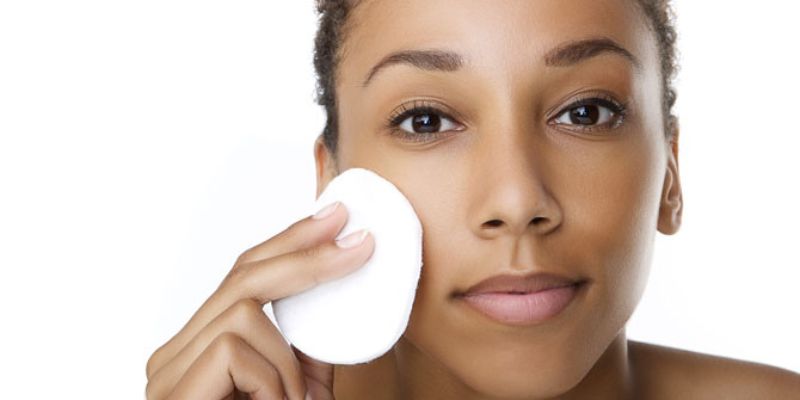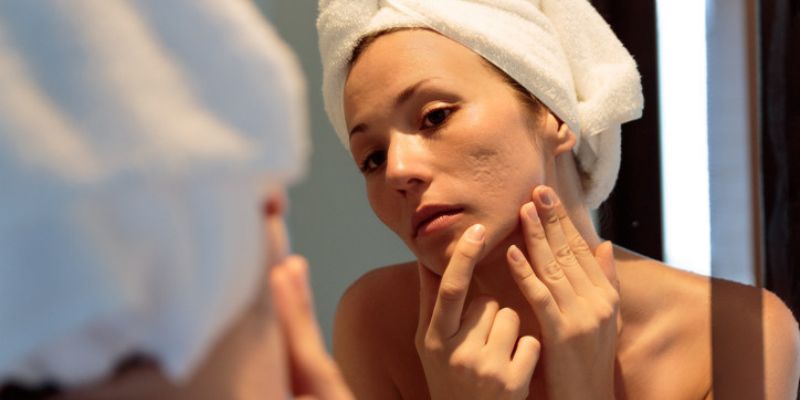How to Prevent Acne: 14 Tips for Clearer Skin
Feb 01, 2024 By Madison Evans
Acne is a common skin condition that affects millions of people worldwide. It can be frustrating and embarrassing, but the good news is that there are ways to prevent it from occurring. This article will discuss 14 tips on how to prevent a pimple from forming.
Keep Your Face Clean
One of the most important tips is to keep your face clean. It means washing your face twice daily with a gentle cleanser to remove dirt, oil, and bacteria that can clog pores and lead to breakouts.

Avoid Touching Your Face
It's important to avoid touching your face throughout the day, as this can transfer bacteria and oils from your hands to your face, potentially causing acne.
Use Oil-Free Products
Using oil-free products is another practical tip for preventing acne. Oil-free moisturizers, sunscreen, and makeup are less likely to clog pores and contribute to breakouts. Look for products that are labeled non-comedogenic, meaning they won't clog pores.
Exfoliate Regularly
Regular exfoliation is also crucial in preventing acne. Exfoliating removes dead skin cells that can clog pores and lead to breakouts. However, it's essential to choose a gentle exfoliator and not overdo it, as excessive exfoliation can irritate the skin and cause more breakouts.
Moisturize Daily
It's essential to moisturize your skin daily. Keeping your skin hydrated helps prevent dryness and the overproduction of oil, which can lead to acne breakouts.
Avoid Heavy Makeup
Another tip is to avoid using heavy makeup, especially oil-based or comedogenic products. These types of makeup can clog your pores and contribute to the formation of acne. Opt for non-comedogenic or oil-free makeup products instead.
Wash Hair Regularly
Washing your hair regularly is crucial in preventing acne. The oils and styling products in your hair can transfer to your face, clogging your pores and causing breakouts. Be sure to wash your hair regularly, especially if it tends to be oily.
Change Pillowcases Often
Changing your pillowcases is also essential for maintaining clear skin. Pillowcases can accumulate dirt, oil, and bacteria over time, which can transfer onto your face while you sleep. Changing your pillowcase at least once a week can help prevent these impurities from causing acne.
Watch Your Diet
Watching your diet can play a significant role in preventing acne. A balanced acne prevention diet rich in fruits, vegetables, and whole grains can help promote healthy skin. On the other hand, consuming excessive amounts of sugary or greasy foods may contribute to acne breakouts.
Stay Hydrated
Staying hydrated is essential. Drinking adequate water helps flush out toxins from the body and keeps the skin hydrated, reducing the chances of acne breakouts.
Reduce Stress
Stress can trigger hormonal imbalances, increasing sebum production and clogged pores. Stress-reducing activities such as exercise, meditation, or hobbies can help maintain a healthier state of mind and, consequently, clearer skin.
Avoid Picking or Squeezing Pimples
One common mistake that people make is picking or squeezing pimples. It can lead to further inflammation, scarring, and spreading bacteria. It is crucial to avoid touching or manipulating the affected areas and allow them to heal naturally.
Use Acne-Fighting Ingredients
Using skincare products with acne-fighting ingredients can also be beneficial. Ingredients like salicylic acid, benzoyl peroxide, or tea tree oil are known for their ability to reduce acne-causing bacteria, unclog pores, and control oil production. Incorporating these ingredients into your skincare routine can help prevent future breakouts.
Consult a Dermatologist
If acne persists despite following these tips, it may be helpful to consult a dermatologist. A dermatologist can provide personalized recommendations and prescribe medications or treatments tailored to your skin needs. They can also address any underlying causes of acne and guide how to prevent further breakouts.

By following these tips for clearer skin, you can take proactive steps to prevent acne and achieve a healthier complexion. Remember that consistency is critical, and it may take time to see noticeable improvements. With patience and a dedicated skincare routine, you can work towards achieving your goal of clearer skin.
Is Ice good for acne?
When it comes to treating acne, many different methods and products are available, and it can be overwhelming to determine which ones work. One common home remedy often suggested is using ice to treat acne. Ice can help reduce inflammation and redness, and it can also help to calm irritated skin.
However, it is essential to note that using ice alone may not be enough to treat acne effectively. Combining ice treatment with other acne-fighting methods is recommended, such as cleansing the skin with a gentle cleanser, topical acne treatments, and maintaining a healthy skincare routine.
Can lime remove pimples?
As for lime juice, it is a natural remedy for acne due to its antibacterial properties. Lime juice contains citric acid, which can help to exfoliate the skin and reduce the appearance of acne scars.
However, it is essential to exercise caution when using lime juice on the skin, as it can cause irritation and photosensitivity. It is always best to dilute lime juice with water before applying it to the skin, and you should do a patch test on a small area of skin before applying it to the entire face.
What food is bad for acne?
A few common culprits are often associated with worsening acne symptoms. One of these is dairy products, particularly milk. Some studies have suggested that milk's hormones and growth factors may contribute to hormonal imbalances that can lead to increased oil production and clogged pores.
Another potential trigger for acne is high-glycemic index foods, such as refined carbohydrates and sugary snacks. These foods can cause a spike in blood sugar levels, leading to increased inflammation and oil production in the skin.
Additionally, some people may find that certain types of food, such as chocolate or greasy foods, can worsen their acne symptoms. However, it is essential to note that everyone's skin is different, and what triggers acne for one person may not have the same effect on another.
It is always best to listen to your body and consult a dermatologist if you are concerned about your acne and its potential causes.
Conclusion
Acne is a common condition, but following these tips on preventing it can reduce its occurrence significantly. Remember that consistency is critical in skincare routines, so stick with these habits for clear and healthy-looking skin.








